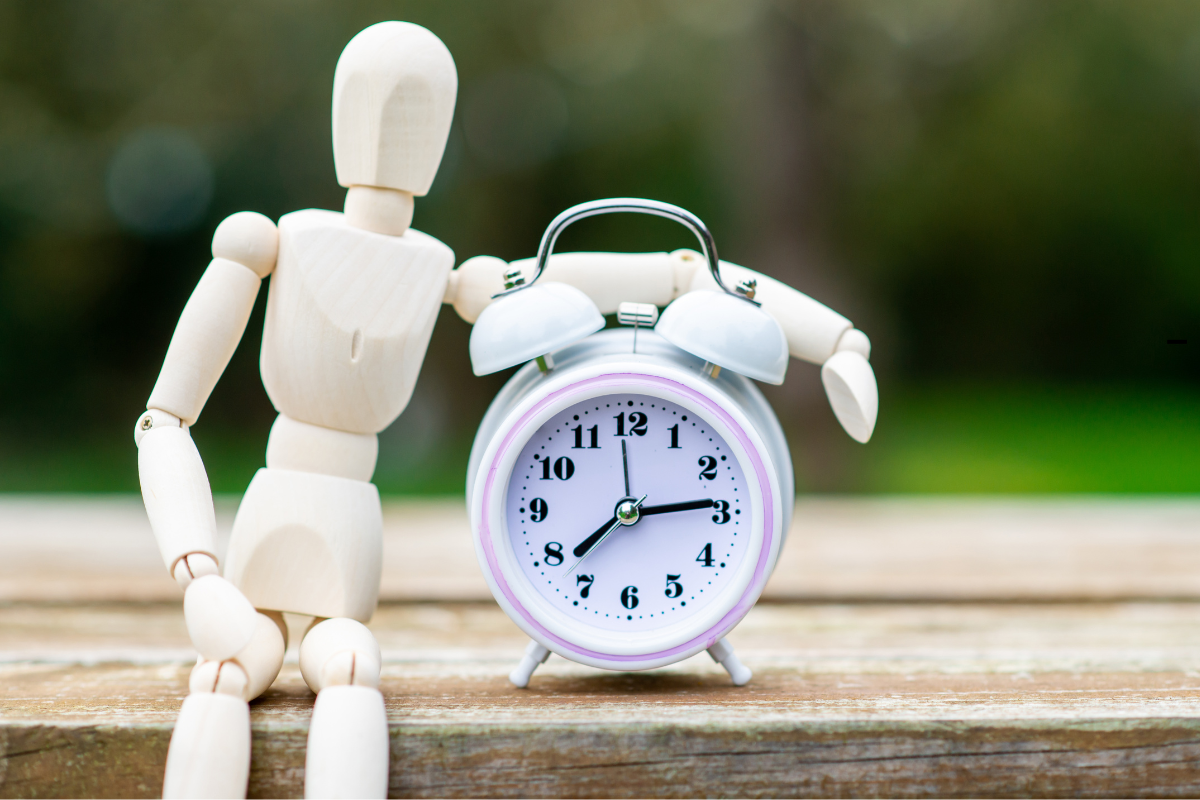Circadian rhythms are natural biological cycles that regulate many of the body’s functions, including sleep, body temperature, hormone secretion and metabolic activity. These rhythms, influenced by the alternation of day and night, orchestrate our physical and mental well-being. When our internal clock is well synchronised, we feel fit and balanced. On the other hand, when it is out of sync, it can lead to chronic fatigue, sleep disorders and other physiological imbalances.
What is the circadian rhythm?
The circadian rhythm is a cycle of approximately 24 hours that regulates our biological functions. It is governed by a brain structure called the suprachiasmatic nucleus, located in thehypothalamus. This nucleus acts like an internal clock, receiving light signals from the retina to adjust our rhythms according to light and darkness.
One of the essential elements of the circadian cycle is the production of melatonin, the sleep hormone. Its secretion begins to increase at the end of the day, when light diminishes, making it easier to fall asleep. Conversely, in the morning, the production of cortisol and dopamine intensifies to stimulate wakefulness and energy.
The phases of the circadian rhythm
The circadian cycle comprises several distinct phases, each playing a key role in the body’s functioning.
Morning: wake-up and energy
Between 6 a.m. and 10 a.m., the body increases its production of cortisol andadrenaline, stimulating wakefulness and alertness. This makes it the ideal time for activities that require concentration and energy. Exposure to natural light not only helps to synchronise the body clock, but also improves mood.
Late morning and afternoon: concentration and efficiency
From 10 a.m. to 2 p.m., body temperature is at its highest and the brain is at full cognitive capacity. This is the ideal time to take on intellectually or physically demanding tasks. Between 3 p.m. and 5 p.m., alertness drops slightly, before picking up again in the late afternoon.
The evening: preparing for sleep
From 6pm onwards, the body gradually begins to slow down. Melatonin production increases and body temperature falls, signalling to the body that it’s time to prepare for sleep. Artificial light, particularly that from screens, can disrupt this process, delaying the onset of sleep.
Night-time: regeneration
Between 10pm and 6am, the body enters a phase of recovery and repair. Deep sleep promotes cell regeneration, memory consolidation and the proper functioning of the immune system.
The impact of circadian rhythms on health
When circadian rhythms are disrupted, the body suffers the consequences. A frequent mismatch between biological rhythm and lifestyle can lead to a variety of disorders.
- Insomnia, night-time awakenings or unrefreshing sleep
- Chronic fatigue and low energy levels during the day
- Digestive problems and metabolic imbalance
- Weakened immune system
- Increased stress and anxiety
- Increased risk of cardiovascular disease and diabetes
The causes of these disturbances can be multiple: excessive exposure to artificial light in the evening, irregular working hours, lack of exposure to sunlight, but also an unsuitable diet or chronic stress.
How can you rebalance your circadian rhythm naturally?
Restoring an optimal circadian rhythm involves adopting lifestyle habits in line with the natural cycles of day and night.
- Exposure to natural light:
As soon as you wake up, it’s essential to expose yourself to daylight, even in winter. This synchronises your biological clock and helps to boost your energy levels during the day. Ideally, you should spend at least 30 minutes outdoors each morning. - Stick to a regular sleep schedule:
Going to bed and getting up at the same time every day helps to stabilise the circadian rhythm. Avoiding late mornings or nights that are too short helps to improve sleep quality. - Limit artificial light in the evening:
Blue light from screens (telephone, computer, television) inhibits the production of melatonin and delays sleep. It is advisable to reduce exposure to screens at least one hour before bedtime and to opt for subdued lighting. - Adapt your diet to your biological cycles:
Eating a breakfast rich in proteins and good fats helps to regulate energy levels throughout the day. In the evening, opt for a light dinner, low in fast sugars, to avoid waking up at night. - Exercise at the right time:
Regular exercise helps to reinforce the circadian rhythm. However, intensive sessions in the evening can disrupt sleep. The ideal time is therefore in the morning or late afternoon. - Managing stress:
Chronic stress affects circadian rhythms by disrupting the secretion of cortisol and melatonin. Meditation, yoga, deep breathing and walks in the countryside are all effective ways of promoting a healthy nervous balance.
Plants and supplements to support the circadian rhythm
Certain adaptogenic plants and natural supplements can help regulate biological cycles and thus improve sleep quality.
- Melatonin, an ally in resynchronising the internal clock
Melatonin is a hormone naturally produced by the pineal gland in response to darkness. It plays a key role in the process of falling asleep and adapting to the day-night cycle. However, its secretion can be disrupted by excessive exposure to artificial light in the evening, shift work or jet lag after long-haul travel.
In supplement form, melatonin can help readjust an unbalanced sleep rhythm by making it easier to fall asleep and shortening the adaptation time when changing time zones. It is recommended to take a low dose (between 0.5 and 3 mg) one hour before bedtime, for occasional use and on medical advice in the case of chronic sleep disorders.
- Valerian and passionflower, for deep, restful sleep
Known since ancient times for their relaxing properties, valerian and passionflower are plants that promote quality sleep by acting on the nervous system.
Valerian has natural sedative effects that help to calm anxiety and make it easier to fall asleep. Its active compounds act directly on the brain’s GABA receptors, which are involved in regulating stress and sleep. It is particularly recommended for people who frequently wake up at night.
Passionflower works gently to calm the mind and reduce mental hyperactivity. Ideal for periods of stress, it helps you fall asleep more quickly and sleep more soundly.
In infusion or extract form, these plants can be used as a course of treatment over a few weeks to restore stable, restorative sleep.
- Magnesium, an essential mineral for relaxing the nervous system
Magnesium plays a central role in regulating stress and sleep by influencing the production of relaxing neurotransmitters such as serotonin and GABA. Magnesium deficiency can lead to nervousness, muscle tension and difficulty falling asleep.
This mineral is particularly recommended for people prone to insomnia linked to anxiety or bodily tension. It promotes muscle relaxation and reduces production of the stress hormone cortisol, which can interfere with melatonin secretion. It is found in foods such as almonds, pumpkin seeds and green leafy vegetables. However, supplementation with magnesium bisglycinate or citrate can be beneficial in cases of deficiency or chronic fatigue.
- Ginseng and rhodiola, for stable morning energy and improved concentration
Adaptogenic plants such as ginseng and rhodiola help the body to better manage stress and stabilise energy levels throughout the day.
Ginseng, which has been used in traditional Chinese medicine for centuries, stimulates physical and mental vitality while boosting the immune system. It helps to combat morning fatigue without causing excessive excitement like coffee.
Rhodiola acts on the production of dopamine and serotonin, supporting concentration and memory. It is ideal for people who suffer from a drop in energy when they wake up or have difficulty getting going in the morning.
Taken in the form of herbal teas, extracts or capsules, these plants are particularly useful for those who have difficulty adapting to changes in pace or who experience a drop in productivity during the day.
- Chamomile and lavender, to soothe the body and mind before bedtime
Plants with calming properties are invaluable in supporting the transition to sleep and reducing the tension accumulated during the day.
Chamomile is known for its relaxing effect on the nervous and digestive systems. It helps to release muscular tension and promotes a state of well-being that is conducive to falling asleep. In fact, an infusion of chamomile in the evening can be an excellent alternative to mild sleeping pills.
Lavender, in essential oil or as an infusion, has recognised soothing properties. Its fragrance promotes relaxation and calms mental agitation. Diffusing a few drops of lavender essential oil in your bedroom or applying a drop to your wrists can sometimes help you fall into a deep, restful sleep.
Combining these plants with a relaxing routine, such as meditation or reading, can therefore improve sleep quality without resorting to medicinal solutions.
Conclusion
Circadian rhythms are an essential component of our biological balance. By adopting habits that respect our internal clock, we can improve our sleep, our energy and our general well-being. A few simple adjustments, such as better exposure to natural light, regular sleep schedules and appropriate stress management, are often all it takes to regain natural harmony with our circadian cycle.





